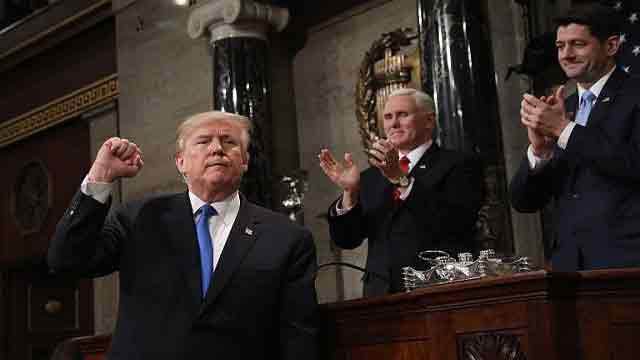Washington, Jan 31 (Just News): “America has also finally turned the page on decades of unfair trade deals that sacrificed our prosperity and shipped away our companies, our jobs, and our Nation’s wealth.” – President Donald J. Trump
STANDING UP FOR AMERICAN INTERESTS: President Donald J. Trump is standing up for American interests and protecting American economic and national security by taking tough enforcement action against countries that break the rules.
In August 2017, the Administration initiated an investigation into Chinese practices related to forced technology transfer, unfair licensing, and intellectual property (IP) policies and practices.
These practices by the Chinese are estimated to cost the United States billions of dollars each year.
Conducted by the USTR, this is the first Section 301 probe since 1997, fulfilling the President’s campaign pledge to use all tools available under U.S. law to combat unfair trade.
In January 2018, the President announced his decision to provide safeguard relief to U.S. manufacturers injured by surging imports of washing machines and solar products.
The President’s decision was based on a series of recommendations made by the independent and bipartisan International Trade Commission (ITC).
This is the first time Section 201 of the Trade Act has been used to impose tariffs in 16 years.
These actions respond to unfair trade practices by China and other countries, including attempts to avoid legally imposed antidumping and countervailing duties.
Following the decision, Whirlpool announced 200 new jobs in Ohio.
The President’s decision will ensure that Samsung and LG follow through on their commitments to produce washing machines in South Carolina and Tennessee, creating more jobs for American workers.
During 2017, the Trump Administration conducted 82 major antidumping and countervailing duty investigations, a 58 percent increase over 2016.
This includes the first self-initiation of an antidumping investigation in 25 years.
Many of these investigations resulted in import duties to address dumping and subsidies, including one in response to Canada’s unfair trade in softwood lumber.
USTR and Commerce are working together to defend the right of the United States to continue treating China as a non-market economy in antidumping investigations until it makes the reforms it agreed to when it joined the WTO.
The Trump Administration has successfully litigated numerous WTO disputes, helping force countries to abandon unfair practices and preserving the U.S. right to enact fair laws.
In November 2017, the United States won a dispute on Indonesia’s unfair import licensing regime that was blocking the export of U.S. agricultural goods.
In October 2017, the WTO determined that the U.S. tuna labeling rules were consistent with WTO standards, helping the United States to inform consumers about safe fishing practices.
In September 2017, the WTO rejected the EU’s allegations that Boeing was receiving prohibited subsidies.
For only the fourth time in the history of the Committee on Foreign Investment in the United States (CFIUS), a government committee that reviews foreign investments for national security purposes, President Trump blocked a transaction when he determined that the foreign investment under review would undermine U.S. national security interests.
PUTTING THE AMERICAN WORKER FIRST: President Trump is renegotiating trade deals and international agreements that have not provided the expected benefits to the United States. The President is also seeking new deals to open markets for U.S. exports and reshaping international institutions to serve the interests of U.S. workers.
The Trump Administration is renegotiating and modernizing the North American Free Trade Agreement (NAFTA) to ensure that it does not harm American workers and companies. This is the first renegotiation of a major free trade agreement in U.S. history.
The Administration is working with Korea to ensure that trade under the U.S.-Korea Free Trade Agreement (KORUS) is more equitable and reciprocal.
President Trump withdrew the United States from the Trans-Pacific Partnership (TPP), because the deal negotiated by the past Administration did not sufficiently prioritize the needs of the American workforce.
The United States is seeking to enter into new trade agreements with countries that commit to fair and reciprocal trade.
The United States is committed to reforming the WTO to ensure that countries are held accountable for breaking the rules and that U.S. sovereignty is respected.
The President shaped Leaders Statements at the G7, G20, and APEC, ensuring that they highlighted concerns about unfair trade practices and promoted fair and reciprocal trade for the first time ever.
THE ART OF THE INTERNATIONAL DEAL: President Trump is negotiating deals to increase U.S. exports and to bring investment to the United States.
In the first few weeks of 2018, the Trump Administration approved the potential sale of $133 million in anti-ballistic missile defense systems to Japan, providing additional defensive capabilities to a key regional ally threatened by the North Korean regime.
On his first trip overseas, President Trump made a $110 billion deal for the intended sales of defense equipment and services with Saudi Arabia – a major regional defense partner and ally.
Foreign companies are re-investing in America, driving job creation and manufacturing across our Nation.
Japanese automakers Toyota and Mazda have announced the creation of a new $1.6 billion Alabama manufacturing plant, contributing thousands of jobs to the American economy.
(Justnews/ys/1350)





